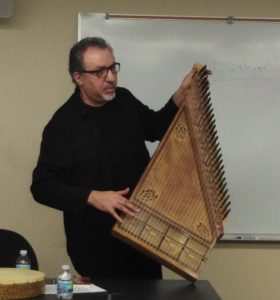 |
With gratitude to funding support from MLL Chairperson Professor Susana Cavallo, the Arabic program at Loyola had enjoyed a mesmerizing demonstration of Arabic classical music sounds and instruments. We are thankful to our kind professional musician Mr. Majed Abu Ajameyeh for his theoretical/historical introduction and unique performances of classical traditional Arab music and instruments! Please join me, Sawsan Abbadi, Director of the Arabic Program in viewing our snapshots and reading samples of students’ voices in reflections:
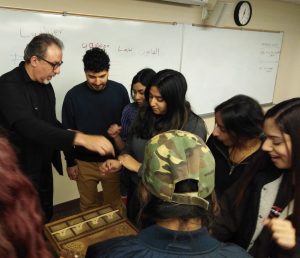 |
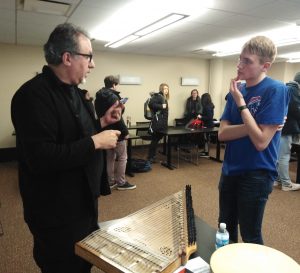 |
Ayesha ( 104): I found the background of the creation of the instrument of the qanoon to be very intriguing. The qanoon connects several different fields of study together: math, physics, and music. Scholars use the Pythagorean theorem to properly place the strings on the instrument. It is amazing how different fields of study allow for the creation of music!
Adrian (104): I thoroughly enjoyed Mr. Majed Abu Ajameyeh’s instrumental demonstrations, as well as his explanations of musical themes in Arabic music compared to western music when considering the musical time signatures.
Wardah (104): The performance given by Mr. Majed Abu Ajameyeh was truly an experience I will cherish throughout my entire academic career. I am always amazed at the beauty and depth music enables individuals to delve into. When he was tuning the instrument and explaining the origin of wood the instrument was designed out of, I began to reflect on the ways in which the instruments we as humans create, are done so to respect the environment it will inhabit, and or the resources readily available to use/access. Classical music, specifically acoustic sounds have always been a kind pleasure for my ears, and God willing, I hope to always spend time learning the history and origin of music, to always grant some time to listening and simply appreciating the art of music. Additionally, I believe it to be crucially important as people who find pleasure in worldly things, to continuously respect the past and historical background of the knowledge we may constantly gain.
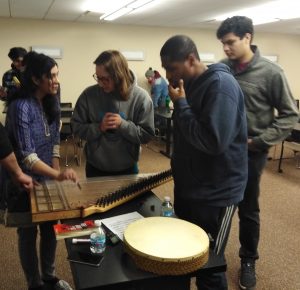 |
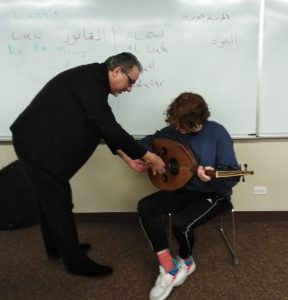 |
Hind (104): Arabic influence and history are often pushed aside in the Eurocentric view. A good example is the Arabic influence on music like Al oud which is an ancestor of the lute.
Lama (104): I found it very interesting when ustaadh Majid told us about how the origin of words we know today come from old Arabic words in music. The term “luthier” which is used to describe a person who makes guitars, comes from the Arabic word “oud” a guitar prototype. The pronunciation was difficult on people not from the region, so it evolved into “luthier.”
Maura (104): I was absolutely mesmerized by the music Mr. Majed Abu Ajameyeh shared with us in class. I didn’t grow up listening to Middle Eastern music, and so I was fascinated to learn about the different time signatures (7/8 or 10/8, as opposed to 3/4 and 4/4 common in Western music) and how the Pythagorean theorem shaped the construction of these instruments.
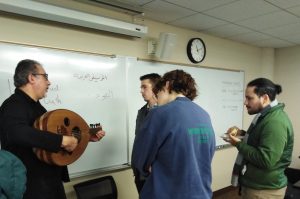 |
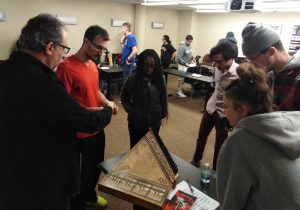 |
Nida (104): I really enjoyed listening to the different instruments and then getting a chance to actually try them as well. It was fascinating how detailed they were in the making and the amazing amount of notes that you play on one. Also, it was so interesting how the names of the instruments connected to how they were made too.
Santiago (104): I have always had an interest in music, but I had never had the opportunity to get such an in-depth analysis of Arabic music. I liked how the القانون instrument also means the law and how it was used in mathematics and music theory classes. It was also very interesting how the العود or Luth instrument was just named after wood and how the Arabic name led to the english name of Luth. Similarly on linguistic intricacies, it is interesting to me how عود kind of sounds like the english word wood, I wonder if it is a coincidence. Listening to the different makam was something new as well, seeing as I had no idea there could be different scales like that. I particularly enjoyed aljihaz from the arabian peninsula.
Maria (102) : Mr. Majed Abu Ajameyeh showed me what happens when you follow your passions. His music was beautiful. It was fascinating to learn about the music theories as well as the history of each instrument along with its musical compositions.
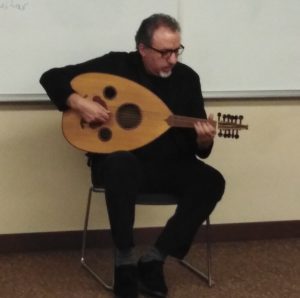 |
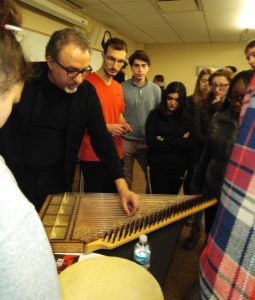 |
Anass (102) : It was honestly really nice to see and hear Mr. Majed play Classical Arabic music. What stood out to me the most was how he became a musician and how he followed his passion. The struggles that he had to go through to follow his passion was truly inspirational. I don’t know much about music, but seeing him play and talk about the styles of music allowed me to relate through recitations. It was a great experience having him come to our class and I would love to see him again!
Dania (102): Mr.Majed educated me beautifully on the different instruments played and the history of each instrument. What touched me the most was his story on his life, and how he had such a strong passion for music, no matter what obstacles in the way he pursued his dreams.
Mohammad S (102): The workshop was an excellent display of numerous type of culture that can influence each other. When he spoke regarding the musical instruments from Spain it was amazing how with the same instrument, historical musical notes could be replayed from the past to a certain extent.
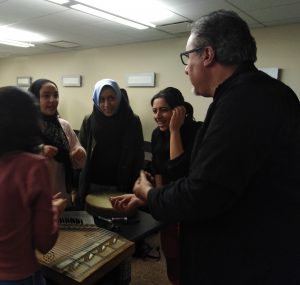 |
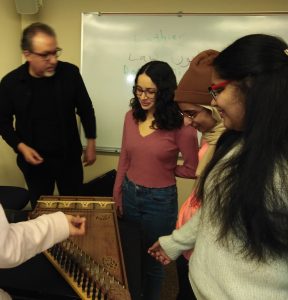 |
Natalie (102): Mr. Ajameyeh’s music and experience was truly inspirational. I’m in awe of his passion for music, and his determination to learn despite the dangerous obstacles he faced in his youth.
Haba (102): The one thing he had spoke about that really provoked me was when he was explaining how he risked his life a lot in order to pursue something he loved and wanted to do. It’s definitely a different feeling that hits when you hear someone’s story in person than watching it on the news.
Sana (102): I was so pleased with the guest speaker Mr. Majed Abu Ajameyeh who came to our class. We often hear middle eastern music in restaurants, class, etc, so it was very cool to see it in real life. Beyond that, he spoke to us about his background and told us his very inspiring story. Just as many other Palestinians, Mr. Ajameyah faced a lot of adversity growing up but managed to push through an fulfill his life dreams. Not only did he leave us with more knowledge but inspiration!
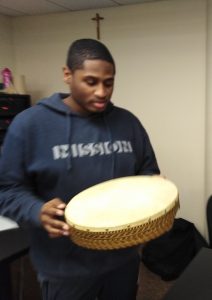 |
 |
Omar (102): Mr. Majed was comprehensibly well versed in the art of music. He established and presented the Middle Eastern instruments with an utmost brilliance, showcasing the exquisiteness in vocal communication.
Haris (102): The workshop was insightful. I have not had any experience with Arabic music prior to this workshop. It was interesting for to see a live performance of the music. While the music was playing, I was imagining how the people who were traveling the desert used music as a way to pass the time. The music and the musician’s description of the music put some things into perspective for me.
Jenna (102): While the beautiful music Mr. Majed Abu Ajameyeh shared with us was breathtaking, his personal story impacted me greatly. His desire to learn with such passion, that he would risk his life to experience, is something that has inspired me to seize every opportunity and take nothing for granted.
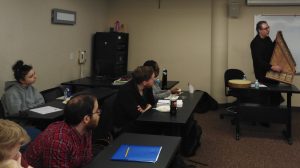 |
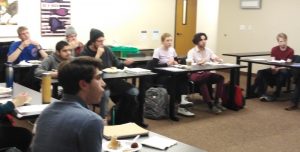 |
Filza (102): Hearing Mr. Majed play some rare instruments made me even more thankful after learning the challenges he went through to make sure he had music in his life. It reminded me to not give up on what I love.
Holly (102): The work of this artist is inspiring, striving to keep music alive on instruments not well known. His dedication to his craft despite the lack of community is deeply motivating.
Nabil (102): This was genuinely one of the most interesting workshops I’ve been to. There was a lot of history behind each instrument, and I appreciated how in depth he went with each instrument, going through all the history behind it as well as even what the names of the instruments signify. It was something I never really had an interest in, but hearing through him knowing he has a true passion for the instruments made it a very interesting experience.
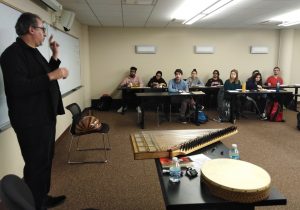 |
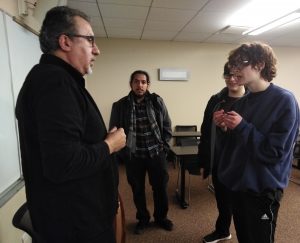 |
Taha (102): Mr. Majed demonstrated how music has the ability to transcend cultures. While people may speak different languages, follow different religions, and practice different traditions, music is the one thing that brings joy and unity across all borders.
Evan (102): I found the commonalities between traditional Arab music and American Jazz. The improvisation in both reinforces that music critical is an expression of freedom, individuality, culture and should be preserved.
Almerah (102): I was very entertained by the music that was played and most of all by the history behind the tunes and instruments that were displayed, which varied by country and culture. I gained a greater understanding of how middle eastern countries are similar in many ways, yet have some minor differences which could also be expressed through the music.
Simon (102): The talk was a fascinating one, with fantastic food also! In showcasing the highly influential music of the Middle East, it also offered a fantastic insight into the etymology and origins of much European music at the same time, including the very origins of both lute and guitar.
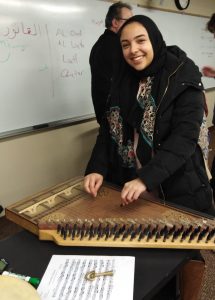 |
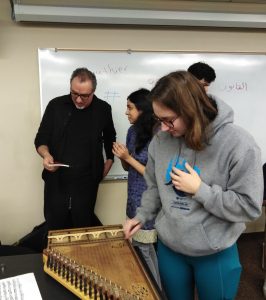 |
